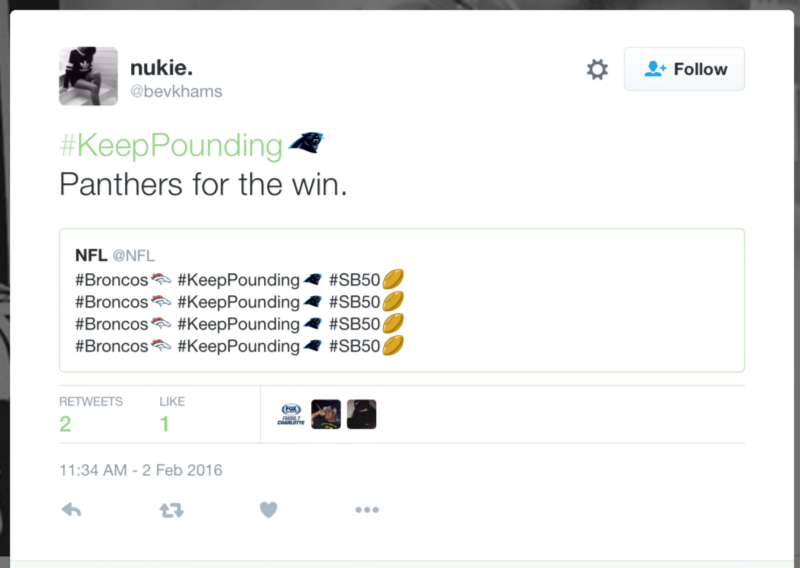When Twitter launched Hashflags aka Twitter custom emojis for the 2010 World Cup, it was seen as a cute gimmick. It didn’t seem that extraordinary. Before emojis were as common and popular as they are today, Twitter essentially inserted an existing and known emoji for the author when they used the country code in the form of a hashtag. Twitter reprised its use four years later for the 2014 World Cup.

Example of custom Twitter emojis for the Batman v Superman: Dawn of Justice movie. Screenshot from Hashflags.
Last year, Twitter went beyond the flag emojis and introduced emojis for special events and select campaigns including Wimbelton, the AMAs, Star Wars, Share A Coke, One Direction’s new album, and many more. You can find them all at http://hashfla.gs. Today, it was revealed that Twitter is charging brands millions for this special treatment.
With the Superbowl coming up this weekend, you’ll see custom Twitter emoji’s for both teams, the Broncos and the Panthers as well as for the event itself. It will also be interesting to see if any of the Superbowl commercials, most of which are promoting hashtags, will also be sporting their own custom emojis on Twitter.
The power of these little 72 x 72 pixel graphics go way beyond the Twitter ecosystem. It essentially makes Twitter the official hashtag registrar. Let me explain.
There is no official registrar or directory for hashtags.
Anyone can introduce a new hashtag or use one that is already in use. There is nothing preventing two organizations or groups from accidentally using the same one or for a group to start using one that was previously in use by another brand or group. Brands value ownership, trademarks, and registries and spend millions of dollars to protect them Now that brands have moved on from the URL as the main call to action in ads and replaced them with hashtags, there is an uneasiness to the lack of a universal hashtag registry.
That is why Twitter offering custom emojis as a service is so brilliant.
Now when a brand wants to promote a hashtag as part of the campaign, they can pay Twitter to create or use a custom emoji that brands the use of the hashtag. This will make it challenging for another organization to claim ownership of that hashtag when the paying brand’s logo or icon appears each time it is used. And because brands use and promote hashtags across social networks, if it works this way in Twitter, brands will likely check there first to ensure that a hashtag is up for grabs. Essentially, turning this service into a registrar.
Another benefit of custom emojis is that it also reduces confusion on what the official hashtag is for a campaign or an event. Take the Superbowl for example. Fans are using a variety of hashtags to support their teams.
This includes:
- #Broncos
- #GoBroncos
- #BroncosCountry
- #BroncosCountryPlayoffs
and
- #Panthers
- #GoPanthers
- #KeepPounding
- #PanthersNation
There are many others, but those seem to the most popular. However, now that Twitter has created custom emojis for each team, it is clear that the official hashtags are #Broncos and #BroncosCountryPlayoffs for the Broncos and #KeepPounding for the Panthers.
For fans that are on Twitter and see that those are the hashtags the generate the custom emojis, it sends a clear signal that if you want the same cool emoji to show up in your Tweet, you also have to use these same hashtags.
You can see the effect it has in the following Tweet:

Official hashtags FTW! (Used an image vs an embed of the Tweet due to custom emojis being available only for a select amount of time)
If these custom emojis weren’t available, I bet that same Tweet would have likely used #Panthers instead of #KeepPounding. With this service, the idea of an official hashtag will be understood and fans will gravitate to hashtags that produce emojis. Hashtag confusion, noise, and proliferation around a campaign will be reduced.
Twitter custom emojis aren’t permanent. They only exist during the campaign period for the hashtag. After the campaign is over, all Tweets that featured the hashtag will no longer display a custom emoji within the Twitter interface. This allows hashtags to be recycled, reused, and possibly be claimed by a different brand.
Twitter’s custom emoji will likely grow in popularity. Fans and consumers will come to expect to see them as part of campaigns. This service from Twitter is very unique, catering to Twitter’s strengths, differentiating it from other social networks.
By introducing the custom emoji, Twitter has become the defacto hashtag registrar.

